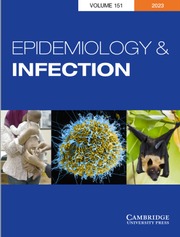Article contents
A survey of Nairobi sheep disease antibody in sheep and goats, wild ruminants and rodents within Kenya
Published online by Cambridge University Press: 15 May 2009
Summary
Core share and HTML view are not available for this content. However, as you have access to this content, a full PDF is available via the ‘Save PDF’ action button.
The distribution of antibody to Nairobi sheep disease in sheep and goats in Kenya was found to coincide closely with that of the tick, Rhipicephalus appendiculatus. The proportions of a population in an enzootic area with antibody was similar in the different age groups. No antibody to the virus was found in rodent sera and while some low titres were found in some wild ruminant sera, these were considered to be most likely cross reactions with antibody to related viruses.
- Type
- Research Article
- Information
- Copyright
- Copyright © Cambridge University Press 1978
References
REFERENCES
Daubney, R. & Hudson, J. R. (1931). Nairobi sheep disease. Parasitology 23, 507–24.CrossRefGoogle Scholar
Daubney, R. & Hudson, J. R. (1934). Nairobi sheep disease; natural and experimental transmission by ticks other than Rhipicephalus appendiculatus. Parasitology 26, 496–509.CrossRefGoogle Scholar
Davies, F. G. (1975). Observations on the epidemiology of Rift Valley fever in Kenya. Journal of Hygiene 75, 219–30.CrossRefGoogle ScholarPubMed
Davies, F. G., Casals, J., Jesset, D. M. & Ochieng, P. (1978). The serological relationships of Nairobi sheep disease virus. Journal of Comparative Pathology (In the Press.)CrossRefGoogle ScholarPubMed
Davies, F. G., Jesset, D. M. & Otieno, S. (1976). The antibody response in sheep following infection with Nairobi sheep disease virus. Journal of Comparative Pathology 86, 497–502.CrossRefGoogle ScholarPubMed
Davies, F. G., Mungai, J. & Shaw, T. (1974). A Nairobi sheep disease vaccine. Veterinary Record 94, 128CrossRefGoogle ScholarPubMed
Davies, F. G., Mungai, J. N. & Taylor, M. (1977). The laboratory diagnosis of Nairobi sheep disease. Tropical Animal Health and Production 9, 75–80.CrossRefGoogle ScholarPubMed
Davies, F. G., Shaw, T. & Ochieng, P. (1975). Observations on the epidemiology of ephemeral fever in Kenya. Journal of Hygiene 75, 231–5.CrossRefGoogle ScholarPubMed
Davies, F. G. & Walker, A. R. (1974). The distribution of bluetongue virus and antibody and the Culicoides vector in Kenya. Journal of Hygiene 72, 265–72.CrossRefGoogle ScholarPubMed
Montgomery, R. E. (1917). On a tick-borne gastroenteritis of sheep and goats occurring in East Africa. Journal of Comparative Pathology 30, 28–58.CrossRefGoogle Scholar
Reid, H.W. & Boyce, J. B. (1976). The effect/of colostrum-derived antibody onlouping ill virus infection in lambs. Journal of Hygiene 77, 349–54.CrossRefGoogle ScholarPubMed
Smith, C. E. G., McMahon, D.A., O'Reilly, K. J., Wilson, A. L. & Robertson, J. M. (1964). The epidemiology of louping ill in Ayrshire: the first year of studies in sheep Journal of Hygiene 62, 53–68.CrossRefGoogle ScholarPubMed
- 19
- Cited by


